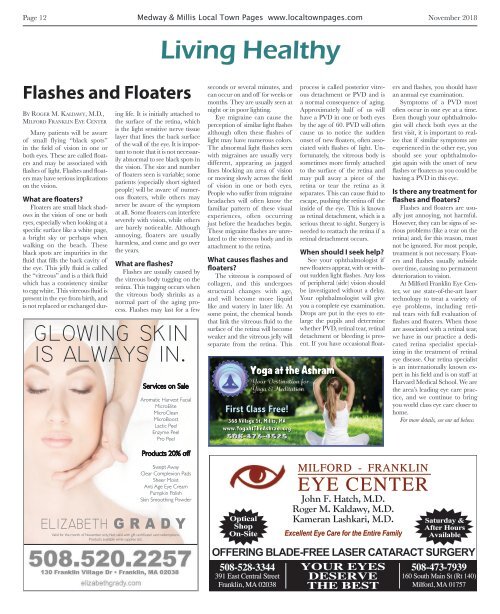Medway & Millis November 2018
Medway & Millis November 2018
Medway & Millis November 2018
Create successful ePaper yourself
Turn your PDF publications into a flip-book with our unique Google optimized e-Paper software.
Page 12 <strong>Medway</strong> & <strong>Millis</strong> Local Town Pages www.localtownpages.com <strong>November</strong> <strong>2018</strong><br />
Living Healthy<br />
Flashes and Floaters<br />
By Roger M. Kaldawy, M.D.,<br />
Milford Franklin Eye Center<br />
Many patients will be aware<br />
of small flying “black spots”<br />
in the field of vision in one or<br />
both eyes. These are called floaters<br />
and may be associated with<br />
flashes of light. Flashes and floaters<br />
may have serious implications<br />
on the vision.<br />
What are floaters?<br />
Floaters are small black shadows<br />
in the vision of one or both<br />
eyes, especially when looking at a<br />
specific surface like a white page,<br />
a bright sky or perhaps when<br />
walking on the beach. These<br />
black spots are impurities in the<br />
fluid that fills the back cavity of<br />
the eye. This jelly fluid is called<br />
the “vitreous” and is a thick fluid<br />
which has a consistency similar<br />
to egg white. This vitreous fluid is<br />
present in the eye from birth, and<br />
is not replaced or exchanged during<br />
life. It is initially attached to<br />
the surface of the retina, which<br />
is the light sensitive nerve tissue<br />
layer that lines the back surface<br />
of the wall of the eye. It is important<br />
to note that it is not necessarily<br />
abnormal to see black spots in<br />
the vision. The size and number<br />
of floaters seen is variable; some<br />
patients (especially short sighted<br />
people) will be aware of numerous<br />
floaters, while others may<br />
never be aware of the symptom<br />
at all. Some floaters can interfere<br />
severely with vision, while others<br />
are barely noticeable. Although<br />
annoying, floaters are usually<br />
harmless, and come and go over<br />
the years.<br />
What are flashes?<br />
Flashes are usually caused by<br />
the vitreous body tugging on the<br />
retina. This tugging occurs when<br />
the vitreous body shrinks as a<br />
normal part of the aging process.<br />
Flashes may last for a few<br />
<br />
<br />
Services on Sale<br />
Aromatic Harvest Facial<br />
MicroElite<br />
MicroClean<br />
MicroBoost<br />
Lactic Peel<br />
Enzyme Peel<br />
Pro Peel<br />
seconds or several minutes, and<br />
can occur on and off for weeks or<br />
months. They are usually seen at<br />
night or in poor lighting.<br />
Eye migraine can cause the<br />
perception of similar light flashes<br />
although often these flashes of<br />
light may have numerous colors.<br />
The abnormal light flashes seen<br />
with migraines are usually very<br />
different, appearing as jagged<br />
lines blocking an area of vision<br />
or moving slowly across the field<br />
of vision in one or both eyes.<br />
People who suffer from migraine<br />
headaches will often know the<br />
familiar pattern of these visual<br />
experiences, often occurring<br />
just before the headaches begin.<br />
These migraine flashes are unrelated<br />
to the vitreous body and its<br />
attachment to the retina.<br />
What causes flashes and<br />
floaters?<br />
The vitreous is composed of<br />
collagen, and this undergoes<br />
structural changes with age,<br />
and will become more liquid<br />
like and watery in later life. At<br />
some point, the chemical bonds<br />
that link the vitreous fluid to the<br />
surface of the retina will become<br />
weaker and the vitreous jelly will<br />
separate from the retina. This<br />
Yoga at the Ashram<br />
Your Destination for<br />
Yoga & Meditation<br />
First Class Free!<br />
368 Village St, <strong>Millis</strong>, MA<br />
www.YogaAtTheAshram.org<br />
508-376-4525<br />
process is called posterior vitreous<br />
detachment or PVD and is<br />
a normal consequence of aging.<br />
Approximately half of us will<br />
have a PVD in one or both eyes<br />
by the age of 60. PVD will often<br />
cause us to notice the sudden<br />
onset of new floaters, often associated<br />
with flashes of light. Unfortunately,<br />
the vitreous body is<br />
sometimes more firmly attached<br />
to the surface of the retina and<br />
may pull away a piece of the<br />
retina or tear the retina as it<br />
separates. This can cause fluid to<br />
escape, pushing the retina off the<br />
inside of the eye. This is known<br />
as retinal detachment, which is a<br />
serious threat to sight. Surgery is<br />
needed to reattach the retina if a<br />
retinal detachment occurs.<br />
When should I seek help?<br />
See your ophthalmologist if<br />
new floaters appear, with or without<br />
sudden light flashes. Any loss<br />
of peripheral (side) vision should<br />
be investigated without a delay.<br />
Your ophthalmologist will give<br />
you a complete eye examination.<br />
Drops are put in the eyes to enlarge<br />
the pupils and determine<br />
whether PVD, retinal tear, retinal<br />
detachment or bleeding is present.<br />
If you have occasional floaters<br />
and flashes, you should have<br />
an annual eye examination.<br />
Symptoms of a PVD most<br />
often occur in one eye at a time.<br />
Even though your ophthalmologist<br />
will check both eyes at the<br />
first visit, it is important to realize<br />
that if similar symptoms are<br />
experienced in the other eye, you<br />
should see your ophthalmologist<br />
again with the onset of new<br />
flashes or floaters as you could be<br />
having a PVD in this eye.<br />
Is there any treatment for<br />
flashes and floaters?<br />
Flashes and floaters are usually<br />
just annoying, not harmful.<br />
However, they can be signs of serious<br />
problems (like a tear on the<br />
retina) and, for this reason, must<br />
not be ignored. For most people,<br />
treatment is not necessary. Floaters<br />
and flashes usually subside<br />
over time, causing no permanent<br />
deterioration to vision.<br />
At Milford Franklin Eye Center,<br />
we use state-of-the-art laser<br />
technology to treat a variety of<br />
eye problems, including retinal<br />
tears with full evaluation of<br />
flashes and floaters. When those<br />
are associated with a retinal tear,<br />
we have in our practice a dedicated<br />
retina specialist specializing<br />
in the treatment of retinal<br />
eye disease. Our retina specialist<br />
is an internationally known expert<br />
in his field and is on staff at<br />
Harvard Medical School. We are<br />
the area’s leading eye care practice,<br />
and we continue to bring<br />
you world class eye care closer to<br />
home.<br />
For more details, see our ad below.<br />
Products 20% off<br />
Swept Away<br />
Clear Complexion Pads<br />
Sheer Moist<br />
Anti Age Eye Cream<br />
Pumpkin Polish<br />
Skin Smoothing Powder<br />
Valid for the month of <strong>November</strong> only, Not valid with gift certificate/ card redemptions.<br />
Products available while supplies last.<br />
Optical<br />
Shop<br />
On-Site<br />
MILFORD - FRANKLIN<br />
EYE CENTER<br />
John F. Hatch, M.D.<br />
Roger M. Kaldawy, M.D.<br />
Kameran Lashkari, M.D.<br />
Excellent Eye Care for the Entire Family<br />
Saturday &<br />
After Hours<br />
Available<br />
OFFERING BLADE-FREE LASER CATARACT SURGERY<br />
508-528-3344 YOUR EYES<br />
391 East Central Street DESERVE<br />
Franklin, MA 02038 THE BEST<br />
508-473-7939<br />
160 South Main St (Rt 140)<br />
Milford, MA 01757

















